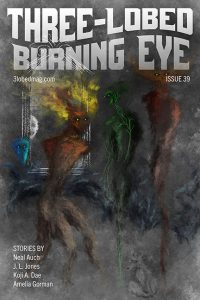Ian Mond Reviews Mouthful of Birds by Samanta Schweblin
 Mouthful of Birds, Samanta Schweblin (Riverhead 978-0399184628, $26.00, 240pp, hc) January 2019.
Mouthful of Birds, Samanta Schweblin (Riverhead 978-0399184628, $26.00, 240pp, hc) January 2019.
I distinctly remember reading Samanta Schweblin’s Fever Dream during my kid’s swimming lessons at the local public pool. I know, I know; I should have been applauding their achievements, but from the opening page, there’s an intensity to the prose that makes it impossible to look away. A woman lies dying in a hospital bed, a small boy – at least she thinks it’s a small boy, she can’t see him – whispering in her ear. The creepiness and overwhelming sense of dread only builds from there. What made Fever Dream so impressive, shortlisted for the Man Booker International Prize in 2017, is how the novella’s hallucinatory, nightmarish atmosphere articulates Schweblin’s concerns, her anger about the free-for-all-use of pesticides across the world, but particularly in Argentina, toxic chemicals that seep into the ground and eventually the food chain. These strengths, to varying degrees, are evident in Mouthful of Birds, Schweblin’s first English language collection translated by the fantastic Megan McDowell (who also did a terrific job with Fever Dream). The 20 stories that feature in the book not only exhibit Schweblin’s uncanny skill to immediately establish mood, but also her ability to discuss difficult topics and themes by embracing the surreal, the strange, and the grotesque.
For example, in the title story, “Mouthful of Birds”, a father struggles with his daughter’s unique eating disorder.
With her back to us, standing on her tiptoes, [Sara, the daughter] opened the cage and took out the bird… The bird screeched and she struggled a moment, maybe because it was trying to escape… When Sara turned back to us, the bird wasn’t there anymore. Her mouth, nose, chin, and both hands were smeared with blood.
The absurdity of a young girl only able to consume live birds (she refuses to eat anything else) only emphasises the fear and bewilderment a parent feels when there’s something wrong with their child, when they don’t conform to what’s generally considered normal. This askew approach is repeated throughout the collection, adding a measure of profundity and provocation to stories that tackle abortion (“Preserves”), infertility (“On The Steppe”), sexism (“Headlights”), mental health (“My Brother Walter”), and infidelity (“Santa Claus Sleeps At Our House”). The strongest of these is the heart-breaking “The Size of Things”, where our narrator, the owner of a toy shop, is entirely caught off guard when one of his best customers, Enrique Duvel, asks to move into the store. Noting how frightened Duvel is, the owner agrees, and over the coming weeks, Duvel starts to organise the toys. His imaginative way of stacking the shelves draws hundreds of customers to the store, but at the height of the shop’s success things go sour and Duvel begins to place the toys he now despises out of reach. I won’t spoil the ending, which is a gut-punch, but you’re never in doubt that this is a story about a child who has experienced terrible abuse, and who now, as an adult, is trying to relive and regain his innocence, his childhood.
My favourite piece though, the one that is the most savage, satirical, horrific, and bat-shit crazy, is “The Heavy Suitcase of Benavides”. When Mr Benavides murders his wife, he decides to stick her corpse in a suitcase. While he has no regrets, not an ounce of guilt, Benavides still feels compelled to visit the sophisticated Doctor Corrales and fess up to his crime. Rather than calls the cops, Doctor Corrales decides to transform Benavides’s violent act into an art installation. The horrible genius of “The Heavy Suitcase of Benavides” is how Benavides, this awful, wretched, pathetic man who murdered his wife, becomes the story’s moral centre, the only person who is genuinely horrified by Corrales’s macabre display, the heavy suitcase and his rotting wife, front and centre.
A version of Mouthful of Birds was initially published in Argentina in 2010, with Fever Dreams arriving four years later. To an extent, then, this is a collection depicting an author learning her craft and as a consequence not every story works; some are a little too opaque, some lean too heavily on the absurd, and some feel like experiments in tone and style rather than self-contained pieces. But even the weakest piece has a mood, an atmosphere that evokes an emotional response. As Schweblin aptly puts it in an interview for The Short Form, “The feeling is captured in the story, and I let the rest of it fall in the reader’s hands.”
This review and more like it in the March 2019 issue of Locus.
 While you are here, please take a moment to support Locus with a one-time or recurring donation. We rely on reader donations to keep the magazine and site going, and would like to keep the site paywall free, but WE NEED YOUR FINANCIAL SUPPORT to continue quality coverage of the science fiction and fantasy field.
While you are here, please take a moment to support Locus with a one-time or recurring donation. We rely on reader donations to keep the magazine and site going, and would like to keep the site paywall free, but WE NEED YOUR FINANCIAL SUPPORT to continue quality coverage of the science fiction and fantasy field.






